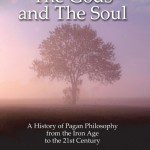 Recently I received a private message asking for my thoughts on death:
Recently I received a private message asking for my thoughts on death:
I was wondering if you might be interested in posting about death from a Pagan/Druid point of view? My wife and I recently lost our cat, whom we loved very much, and I was just curious what sort of wisdom you might have on the topic.
First, my condolences on the loss of your cat. Our animal friends are part of our families. We care for them, they give us love, and in the process we’re reminded that all living things have inherent value and worth. The loss of their love and companionship is real and painful and we grieve those losses as we would grieve any other.
When confronted with death, we all want to say something comforting, something wise, something that will express our sympathies but also something that will help. But there are times when words are inadequate and even actions are insufficient. We can’t make the pain go away. All we can do is be present, hold a hand, fetch some water, and let the grieving person know they are not alone.
Death is not the time to speculate on the afterlife. Funerals frequently involve repetition of doctrines about death and what comes afterwards, but unless the grieving firmly believe those doctrines, they may fall flat. Most of us in the 21st century – Pagans, Christians, and atheists alike – hold our beliefs rather lightly. This is a good thing – it keeps us open to new ideas and new experiences. But it also means that a painful event may shatter our beliefs. I’ve seen folks who were committed Evangelical Christians abandon their faith and their hope in the face of death.
For Pagans, talk of the Summerlands or Tir n’an Og or the Cauldron of Rebirth may be no comfort for someone who only knows their loved one is no longer with them.
Instead, focus on what we know. Someone was born, they lived, they loved, and they have died. Death is not the opposite of life, death is part of life. Birth is the transition from where ever we were before to this life; death is the transition from this life to whatever comes next. We don’t have to debate what that before and next are to recognize death as a natural transition.
Death tells us to remember. The mainstream culture is constantly telling us to forget, to move on to whatever is new and bright and shiny. But when we remember the deceased, when we tell their stories and revisit the past, we honor them and we realize there are things worth preserving.
That which is remembered lives.
Death creates urgency. Death reminds us to consider how we will live – how many of our limited hours do we want to spend in front of the TV or the computer? What have we told ourselves we’ll do “some day”? If we don’t set a date and make plans, some day will never come. But death will.
I’m a strong proponent of doing what must be done, of making a living. But at what point do we have enough? At what point does making a living become an obsession that keeps us from living?
Death reminds us to consider how we want to die. There are worse things than death – like spending months or years with machines keeping our bodies alive while our souls yearn for release. How do we want to spend our final days? A good life should include a good death.
What funeral rites do we want? What funeral rites do we need? From the dawn of humanity, people have gathered together to perform funeral rites. The form and function of these rites have varied from place to place and culture to culture. But people in all lands have recognized that the death of a loved one is an significant event in the life of a family and of a community; an event that should be solemnized.
Funerals help the deceased transition from the land of the living to the land of the dead. Funerals make real to us the fact that a loved one has left our immediate presence and has become an ancestor.
Some day we too will join the ranks of the ancestors. How do we want to be remembered?
Our mainstream culture tells us to ignore death, to pretend it will never come, to stave off old age with drugs and cosmetics. It promises that technology will someday make death obsolete… at least for those who can afford it. It whisks the dead away and hides death behind soft words, begrudgingly grants a day or two of bereavement leave (if we’re lucky) and then expects us to get back to work like nothing ever happened.
This is not helpful. This is not healthy. Take the time you need to return to normal – to find a new normal – on your own timetable.
It’s hard to think deeply about death when you’re experiencing it – the pain is too great and the grief is too immediate. The time to think about death is a sunny day in June when all is well and you feel like you’ll live forever even though you know you won’t. When you feel safe, using your intellect and your intuition consider the subject, weigh the various ideas and teachings, and decide for yourself what rings most true.
The time to think about death is the season of Samhain, when the Veil Between the Worlds grows thin, when we can peer behind it and get a glimpse of what comes next. By visiting the other side in meditation and visualization it becomes familiar, and we lose our fear of the unknown on the other side of death.
There are some good Pagan poems and liturgical works on the subject of death, but I’d like to end this piece with a reading from the Quaker William Penn (yes, that William Penn). This is “Union of Friends” from Fruits of Solitude:
They that love beyond the World, cannot be separated by it.
Death cannot kill, what never dies.
Nor can Spirits ever be divided that love and live in the same Divine Principle; the Root and Record of their Friendship.
If Absence be not death, neither is theirs.
Death is but Crossing the World, as Friends do the Seas; They live in one another still.
For they must needs be present, that love and live in that which is Omnipresent.
In this Divine Glass, they see Face to Face; and their Converse is Free, as well as Pure.
This is the Comfort of Friends, that though they may be said to Die, yet their Friendship and Society are, in the best Sense, ever present, because Immortal.
















